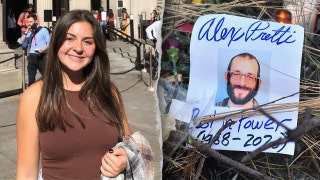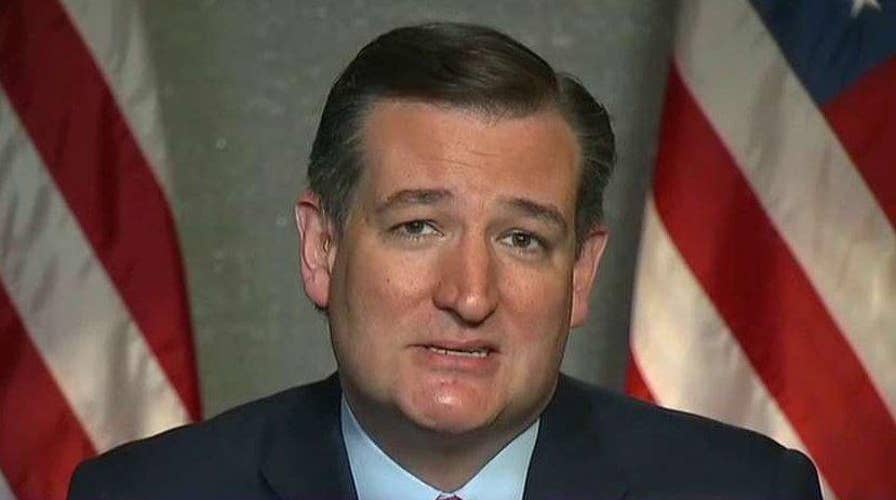Is Indiana do or die for Ted Cruz?
Republican presidential candidate weighs in on 'Fox News Sunday'
Sens. Bernie Sanders and Ted Cruz significantly trail the front-runners in their respective Democratic and Republican presidential primaries, but both said Sunday they will stay in their races until the end, even amid bad news about the Indiana primary on Tuesday.
“We intend to fight for every vote and every delegate remaining,” Sanders said at a press conference in Washington, D.C., before heading to campaign events in Indiana.
The Vermont senator said Democratic front-runner Hillary Clinton winning enough pledged delegates in the remaining state contests to secure the nomination before the July convention would be “virtually impossible.” So his only path to the nomination will be to flip superdelegates, the party insiders who can back either candidate and are overwhelmingly behind Clinton.
“In other words, the convention will be a contested contest,” Sanders said.
Clinton is still 91 percent of the way to the nomination, according to the Associated Press. She is 218 delegates away from winning the 2,383 need to clinch the nomination.
Sanders’ remarks came at about the same time an NBC/Wall Street Journal/Marist poll showed him trailing Clinton in Indiana 46-to-50 percent, roughly the same margin as in other recent polls.
The poll also shows Cruz trailing GOP front-runner Donald Trump in Indiana 49-to-34 percent, despite Cruz essentially putting all of his efforts into winning the state and stopping Trump’s six-state roll. (The poll also showed Ohio Gov. John Kasich, the third GOP primary candidate, with 13 percent.)
Cruz said Sunday he hoped to do well in Indiana. However, he said on ABC’s “This Week” that “We are going the distance. We are competing the entire distance.”
The Texas senator spent little time campaigning in the six Northeast states that Trump handily won and instead spent much of his time in Indiana.
He also cut a deal with Kasich that would allow him to compete head-to-head with Trump in Indiana. And last week he named former primary rival Carly Fiorina as his running mate and announced the endorsement of Indiana GOP Gov. Mike Pence.
“I have faith in Hoosiers -- in the common sense good judgment of the men and women of this great state,” Cruz said Sunday at a rally in Lafayette, Ind. “And if we unite, we’re going win this nomination.”
Cruz has gone back and forth on whether Indiana will be a make-or-break contest for him, even telling California Republicans on Saturday that their June 7 primary will decide the GOP race.
Trump leads in the delegate count with 996, followed by Cruz with 565 and Kasich with 153, with 1,237 needed to secure the nomination before the July convention.
Clinton has 2,165, compared to 1,357 for Sanders.
Republicans will compete for 57 pledged delegates in Indiana, and Democrats will compete for 81.
Trump, Clinton and Sanders also had events Sunday in Indiana, with Clinton also scheduled to deliver a speech to the NAACP in Detroit.
At a rally in Fort Wayne, Trump focused his attack on Cruz, saying he has “no road to victory” and is “the first person in the history of the United States who picked a running mate … when he has no chance to win.”
Earlier in the day, he repeated his argument that Clinton has so far had a successful campaign largely because she is a female candidate.
“The only card she has is the woman card,” Trump told “Fox News Sunday.” “Even women don’t like her. If she were not a woman, she would not even be in this race.”
Former President Bill Clinton drew boos and shouts from the crowd as he made a campaign stop in Logan, W.V., on his wife's behalf, ahead of the state's May 10 presidential primary.
And Supporters of Sanders and Trump gathered outside the school as Clinton spoke Sunday. According to WVNS-TV, a letter written on behalf of Logan officials told Democratic Sen. Joe Manchin's staff in an email that the Clintons "are simply not welcome in our town."
Hillary Clinton, who planned to campaign in Williamson on Monday, has been criticized for comments that her policies would put coal miners and companies out of business. Clinton said later she was mistaken and that she's committed to coalfield communities.
Sanders has brought in about $26 million in April in his primary challenge to Clinton, a steep decline from the $46 million he raised in March, raising questions about whether he can sustain his powerful online money machine as his path to the nomination has substantially narrowed against Clinton.
The Associated Press contributed to this report.













































